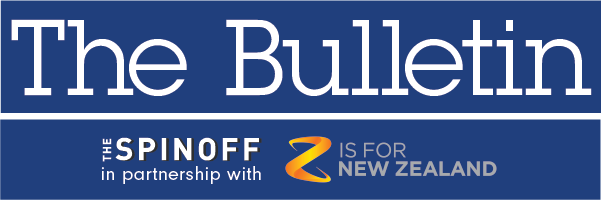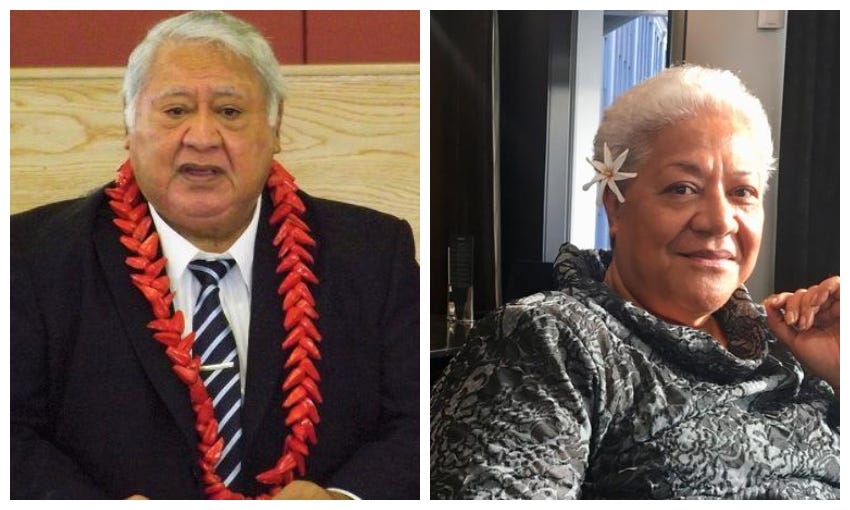Change looms in Samoa after knife-edge election
After decades of one party dominating Samoan politics, a new party is on the verge of taking over
Good morning and welcome to The Bulletin for Monday 12 April, by Alex Braae for The Spinoff. Presented in partnership with Z Energy.
In today’s edition: Change looms in Samoa after knife-edge election, another border worker has tested positive for Covid-19, and dozens of organisations call for Misuse of Drugs Act to be scrapped.
Image: PM Tuila'epa Sa'ilele Malielegaoi and FAST leader Fiame Naomi Mata'afa (RNZ Pacific)
The balance of power could be shifting in an important country in our neighbourhood, after a big election swing. The dominant Human Rights Protection Party may end up losing power in Samoa after decades in office, with the newly formed Faatuatua i Le Atua ua Tasi (FAST) taking a surprisingly large share of the vote. FAST was founded last year by MPs who split from HRPP, in large part over a controversial land ownership reform bill. RNZ Pacific reports unofficial results show the split between the two big parties is so close, it is likely to come down to a kingmaker independent MP. Tuala Iosefo Ponifasio, told the Samoa Observer that he wants to see change in the way politics is done, with less corruption and higher standards of conduct.
Right now, both FAST and the HRPP appear to have 25 out of 51 seats – to give a sense of the swing, that would mean a loss of 11 seats for the HRPP compared to the 2016 election. Final results are still pending, so that could change in two weeks when the official count is completed. And there has been controversy in the aftermath. RNZ Pacific reported late last night that PM Tuila'epa Sa'ilele Malielegaoi has accused FAST of "blatantly violating election laws", while the Electoral Commission chief has been in the news staunchly defending the integrity of the counting process.
But it's worth noting just how unlikely this (preliminary) result is. The power of the HRPP has led to Samoa being a de-facto one-party state for generations, and PM Malielegaoi has been in office since 1998. As this editorial in the Samoa Observer put it, the country has seen something of a political awakening.
On the ground these past few months, we have seen our fellow countrymen and women slowly come out of their political shells. A year ago you would be hard pressed to find a F.A.S.T. supporter in your daily travels. But this year? It has been a game changer.
The campaign was marked by some astonishing allegations made against the opposition. Members of FAST were accused of "treason" by the PM, over speeches and campaign activities. Samoa Global News reports there were warnings put out to supporters of competing parties to "stay clear" of voting booths, to allow voters peace and quiet to cast their ballot without intimidation. In the end, it appears the election was carried out perfectly peacefully.
Meanwhile, the Samoa Observer reports that a quota system for women MPs will not need to be activated, after a sufficient number of women won seats outright. And for the first time ever, Samoa might end up with a female PM. Fiame Naomi Mata'afa is the leader of FAST, and is herself a former deputy PM – if her party is confirmed as having a majority in parliament she'll take the top job. If you want to get a sense of who this politician is, she'll be interviewed on TV One's Breakfast show at 7.40am today.
Another border worker has tested positive for Covid-19. They are a close contact of the security guard who tested positive last week. New locations of interest have been added, dating back to March 29, all in the Auckland suburb of Mt Roskill. The case has increased the pressure on the MIQ system generally to only have vaccinated workers in front line roles – Radio NZ reports National wants the front lines cleared immediately of those who haven't been vaccinated, and PM Ardern said that process will begin from today.
Meanwhile, some interesting reads on Covid: Stuff's Kate Newton has gone through the data and found that pre-departure testing is having little impact on the rates of people turning up in MIQ with Covid. The policy may be having an effect on people's choices before travelling (or may not, that's very hard to measure) and the slight drop in rates of Covid cases in MIQ could be more down to sharp drops in new cases in countries like the UK. On The Spinoff, Dr Andrew Chen writes about a small change to the Covid app, which could end up having a big impact on how assiduously people use it.
And on the decision to suspend travellers from India, which is now in effect: Dr Siouxsie Wiles goes through the data that was used to make the decision, describing the state of the outbreak in India right now as 'unprecedented'. Green MP Golriz Ghahraman writes that while she has "no doubt that the latest measure to ban flights from India was taken with the best of intentions", there have to be concerns that many South Asian people will feel the decision is unfair and divisive.
Dozens of NGOs and social service organisations have called for the Misuse of Drugs Act to be scrapped, and replaced with a law that treats drugs as a health issue. Newshub reports the group includes the likes of the New Zealand Medical Association, Public Health Association, Māori Law Society, JustSpeak and the Mental Health Foundation. Justspeak director Tania Sawicki Mead said “support for this change comes from both sides of last year’s cannabis debate; it’s clear that there is a strong consensus from across the health, addiction and social justice sectors that a health based approach would benefit all of our communities.”
The Spinoff can’t exist without our members. If you want to help us stay curious and keep our team across New Zealand’s breaking stories, please donate today.
Jobs are being put at risk in heavier forms of industry from high wholesale power prices, reports the NZ Herald's Hamish Rutherford. Spikes are going twice as high as average prices, and in some cases higher. There have already been a few job losses in which high power prices have been cited as part of the reason for facilities to close down. I know I've chucked this story in a few times now, but it really does make me think about Jalco in Te Puke, whose incredibly smart investment in solar panels will now be insulating them from price spike pain.
It turns out many of the Pike River families aren't actually all that comfortable with the efforts to recover bodies ending. Newshub reports spokesperson Bernie Monk said the government has broken its promise to return the bodies to the families, and want reentry efforts to continue. Minister Andrew Little has basically said that further spending on recovery can't be justified and won't get through cabinet, but that forensic work and scene examinations would continue.
Prince Philip, husband of Queen Elizabeth, has died at the age of 99. A memorial service will be held in Wellington following a funeral in England. The PM expressed condolences on behalf of the country, and there was a gun salute yesterday. Prince Philip leaves behind a complex legacy. He was a man who devoted his life to public service, for example through the Duke of Edinburgh awards, which encouraged hundreds of thousands of young people around the world to volunteer in their communities. Prince Philip was also a representative of an institution many believe shouldn't exist any more, and to many embodied views out of step with the modern world. He is survived by the Queen, and the four children they had together.
Got some feedback about The Bulletin, or anything in the news?
Drop us a line at thebulletin@thespinoff.co.nz
Right now on The Spinoff: Paul Davies writes about the brighter prospects house hunters have over in Australia right now. Michael Andrew meanwhile looks at the laughably long time it currently takes to save for a deposit in New Zealand. Jack Marshall reports on the drug dealing taking place on social media platforms like Instagram. Jihee Junn looks at the strange disappearance of Onzo bikes from the streets. Michelle Langstone meets Brian Turner, one of New Zealand's most celebrated poets. George Driver spends a dream birthday wandering alone around Invercargill. And Charlotte Muru-Lanning reviews the Haka Party Incident play, which covers a seminal moment in this country's history of race relations.
Calls are growing for an official apology to be made for the Dawn Raids era, in which Pasifika people lived in fear of being ripped out of their homes and deported. Writing on E-Tangata, former race relations commissioner Joris de Bres – an anti-apartheid campaigner at the time the Dawn Raids were taking place – looks back at the reality of what that period was like, and urges people not to forget that ugly chapter of our history. Here's an excerpt:
There was comfort in being at the church. It was a safe haven from the suddenly threatening world of the night at home, a place with friends and family who could be trusted, in the presence of their God. It was like the church of the early Christians, and the fervent prayers were about their own persecution. The singing was even more heartfelt than usual.
Then, suddenly, there was panic. Police swarmed through the house, with dogs. There was no way out. People huddled together as the house was searched, and immigration officers asked them, one by one, for proof of their identity.
By now, those who could produce their passport carried it with them. But the unlucky ones were taken out, and then disappeared — heads bowed and shoulders hunched in fear and shame — through the doors of the police van. The minister, who a short time before had been leading them in prayer, was among them. He couldn’t produce his passport, even though he was legally in the country. No one and nowhere was safe anymore. What had become of the dream that had brought them to New Zealand?
A weekend of punishment for Super Rugby fans: Both games went to golden point, and in both the home team supporters were left on the losing side. The NZ Herald had a wrap of the Crusaders slipping past the Hurricanes, after struggling to put away what on some weeks might have been an easy win. Meanwhile the competition's fellow strugglers at the Highlanders were unable to hang on against a scrappy Chiefs team in Dunedin.
That's it for The Bulletin. If you want to support the work we do at The Spinoff, please check out our membership programme.







